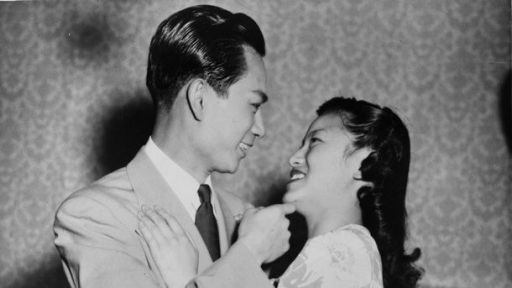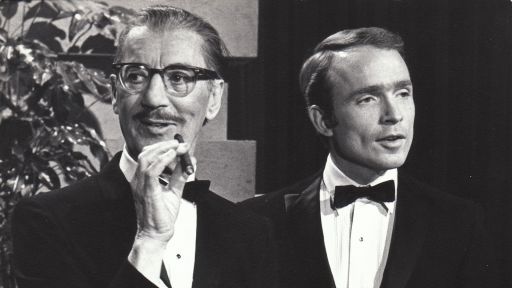TRANSCRIPT
- I do think that the one, that there are several reasons why her, why she's an icon why she survives all this time with such intensity.
One, is that she represents everything that men, at least immature men want, which is a woman who is completely sexual, completely childlike, and not threatening in any way.
Another is that she represents what women still, though more in the past, fear, being completely vulnerable, completely childlike, and completely at the disposal of society in general and and men in particular.
Another is that her story was not finished, it was ended young.
So I think any story that ends very, very prematurely causes us to try to continue it in our heads.
What would've happened?
You know, so, you know, a person who dies and you know the end of their story at a logical time, no matter what the end is, acquires less obsession than what might have happened.
The essay for Ms. Magazine, which was a cover story, got a response that told me she was even more of a figure of importance and resonance, at that time after her death, than she had been even immediately after her death.
Because women were beginning to admit that they saw herself, themselves in her.
Up to that time, really she had been a creation of male moviegoers, mostly male photographers, male filmmakers.
And she herself had always said, I feel like I'm a creation of men, and women don't like me.
But once the women's movement came along, perhaps women were more able to admit that they felt related to her vulnerability, related to her being a sex object, related to her sexual abuse when she was a child.
- [Interviewer] Did it surprise you that the response to that article at that time was as ebullient as it was, as big as it was?
Or did you...? - Well, the response to the article both surprised me and didn't surprise me.
It surprised me because of the length of time since her death and because we had debated whether we should do it as a cover story at all.
On the other hand, it didn't surprise me because I also was fascinated with her and just able to admit it because during the time when she was making most movies, I felt embarrassed by her.
I never walk out of any movie, no matter how bad.
Two consecutive sentences and I'm saying, and then what happened?
I get hooked on the story.
Yet I walked out of 'Gentlemen Prefer Blondes' because I was embarrassed by her because she was a joke.
She was vulnerable.
She was so eager for approval.
She was all the things that I feared most being as a teenage girl.
And ultimately, I walked out.
But it wasn't until the women's movement came along much later in my life that I realized that we had to look at the why of those feelings.
It wasn't that we made them up.
It was because we lived in a society that made women feel vulnerable.
- [Interviewer] There was sort of Betty Joan Persky and Norma Jean Baker, both of whom become Lauren Bacall and Marilyn Monroe, either side of that coin, one being the very classy, chic, sexy image, sexy icon.
The other being this exactly that, it's just, just too much.
And you do feel she's just completely, she's in drag herself.
- Well, it's interesting that men who are female impersonators don't try to do Lauren Bacall.
She was too close to her own human self.
But because Marilyn Monroe was so rewarded for creating an artificial self, it's easier to recreate her.
And so they do do her.
And I know when I look at men who are female impersonators, part of the reason that I feel uncomfortable is because I also was trained to be a female impersonator.
I fight it, but I don't completely succeed because I'm a fifties person.
And you're formed by your childhood.
And it's embarrassing.
It's a verbal version of being a visual female impersonator.
Or all those times we've giggled and laughed and said the equivalent of how clever of you to know what time it is.
Just submerged our own intelligence, become an artificial creation.
And that's what Marilyn Monroe was so rewarded for doing that she could be her own intimate, personal self who had been an athlete, who loved to surf, who loved animals.
A much more natural person.
- [Interviewer] And certainly yes, at the same time, she was also battling in herself this desire to better herself constantly, the desire to not be considered a joke, the desire to be taken seriously.
- The only difference between this state in which many women live, of being different persona, and multiple personality disorder is that we are co-conscious.
We know what we're doing in each state.
But it is almost as artificial to put on what society wants us to be and play roles of being a sex object, of the perfect mother, the perfect whatever.
The big downside here is we may lose track of who we really are as unique human beings inside.
If the artificiality, the role, the stereotype, the sex goddess is what you are mostly rewarded for, it's extremely difficult to let it go.
You have very little assurance that you're going to be loved and salaried as your real self, as your unique, underneath self.
There isn't, even now, much evidence of of female human beings being rewarded for that, though there is lots more.
But there was much less in in the fifties that formed Marilyn.
- [Interviewer] Do you think she was, do you think she was rather canny about all of that too?
I mean I think she was, she certainly used it.
- Well, I think canny comes with choice.
And I'm not, her choices were rather limited.
She was a survivor, I would say, rather than canny.
She, under pressure, had to survive and was reasonably well able to do that.
But she never really was able to use her persona to get ahead in conventional terms.
For instance, she made almost no money in her lifetime.
Everybody else profited off the hundred million dollars that the films made, even had made at the time of her death.
It happens to artists who are not recognized during their lifetime, that people after their death make the money.
But what doesn't happen so often is that while you are alive, everybody else profits off you.
And that's what happened to her.
She was a contract player.
She was making less than three thousand dollars a movie when even her own co-stars were making five and ten times that much because they weren't contract players.
So even in her own lifetime, she was not able to use her fame and her accomplishments to gain security.
She was still feeling that she could only have security by attaching herself to a man who represented it.
- [Interviewer] It seems to me that as the generations have evolved, that young women today know her and like her more than perhaps we did, or my generation did, or yours.
- Well, I think that young women today see her differently.
And to me, the mark of that difference is Madonna because Madonna came to public attention by imitating Marilyn Monroe, by dressing like her, looking like her, singing about her in a way.
But the big difference is that Marilyn Monroe's fans that created her were young and middle aged men.
And who created Madonna's fans or who created Madonna were young women.
And the difference is that Madonna was not vulnerable.
Madonna was taking these symbols of Marilyn and using them in her own control.
She's nobody's victim.
She's using them for power.
So young women are so relieved to see a woman who can be sexual without being victimized by it.
So they loved that.
And her fans were mostly young women just as Marilyn's were mostly older men.
I mean, it's true of all of us, you know that how we know we have something to say is that we were listened to as a child.
How we know we are lovable is that we were loved as a child.
If those things were absent, it takes a long time to make up for them.
And she really didn't have much opportunity to help to repair her early damage.
Yes, she was in therapy, but a lot of it was Freudian therapy and questionable.
She was living in a society where there wasn't much support.
What makes her so riveting for women, especially since the advent of the modern women's movement say 35 years ago or whatever, is that we wonder if we could not have saved her by making a place where she could tell everything.
Because that's what we've done for each other.
And since we didn't have, and especially Marilyn whose mother was in a mental institution, but since a lot of us had mothers who were driven crazy by society or who just couldn't be powerful, through no fault of theirs, society wouldn't let them be powerful.
In some sense, we were motherless.
What the women's movement has done is to allow women to become each other's mothers and to support and model and hope and praise and love each other enough so that we can begin to repair the early damage.
So we wonder, all of us, if we could not have saved Marilyn's life.






